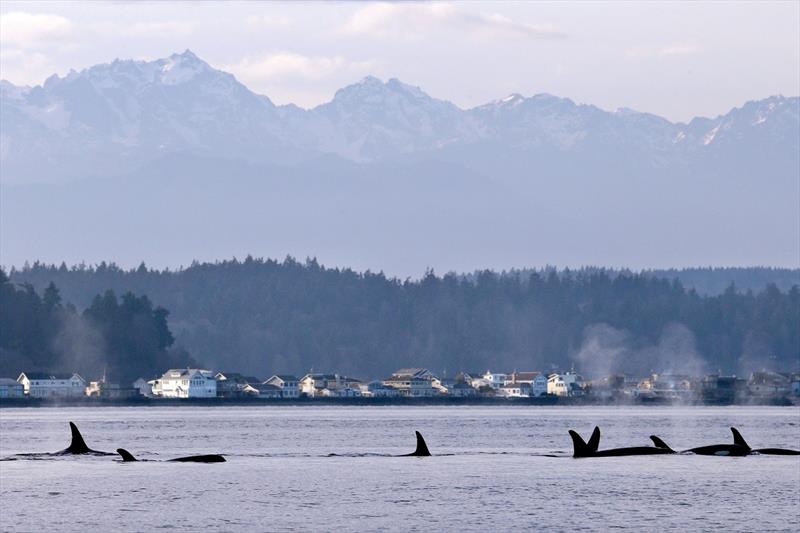
Choking on wildfire smoke in Seattle
by David Schmidt 27 Aug 2018 11:00 PDT
August 27, 2018

Orcas from pod J in Puget Sound just west of Seattle. The number of orcas in the area, listed as endangered since 2005, has dwindled to a 30-year low © Elaine Thompson / Associated Press
As sailors, we harness Mother Nature's natural forces to travel through two fluids, air and water. While the math gets complicated, quickly, when considering the physics behind sailing, all sailors can agree that sailing well involves working with your boat and your team to ensure efficiency at all points of sail through both mediums. But what happens when one of the two fluids becomes physically contaminated or rendered otherwise hostile to the intentions of even the fastest sailors? If your mind is racing to the Great Pacific garbage gyre, you're on the right path, and while there's no question that plastics and other garbage in the water presents a clear and present danger to the oceans and to humanity, it's important to remember that air can also turn stank.
My first time experiencing seriously foul air came in Delhi, India, en route to the Himalaya, in the fall of 1999. While virtually everything about that trip involved sensory overload, I can still remember walking through the ancient streets near Delhi's historic Red Fort, my eyes burning with particulate matter than felt like 120-grit sandpaper on my eyeballs. I can also still remember my surprise at seeing the sun through so much smoke and pollution and being amazed that-much like during an eclipse-I could look directly at the sun, sans sunglasses or sun blindness.
But mostly I remember watching the sun slide below the western horizon that evening, appearing through the bad air as an otherworldly entity, not the friendly, life-supporting sun that I had known my entire life.
Needless to say, I was happy to escape Delhi's wretched air for the high-altitude wilds of the Nanda Devi Sanctuary, where the sun and sky resumed their usual appearance, albeit with precious little oxygen to breathe.
Flash forward some 19 years, and my hometown of Seattle has again taught me about the importance of clean air.
While our recent national news cycle has rightfully been dominated by the passing of a truly great American war hero, senator and two-time presidential candidate who honorably dedicated his life's work to the service of the country and people that he loved, irrespective of the costs to himself, many parts of the West Coast have been blanketed in thick clouds of smoke from myriad wildfires that are blazing from California up into British Columbia.
Unlike my experiences in India, where a wind shift just brought in pollution from a different part of the country, Seattle has been playing a patience game where breeze from the north brings smoke, while westerly's offer fresh, clean air from the open Pacific.
Exactly how bad is this smoke? Anyone familiar with Maine's pea-soup fog would have felt at home in Seattle last week, where the entire Puget Sound basin was literally filled with smoke, preventing one from seeing across the water to Bainbridge Island or the saw-blade ridgeline of the Olympic Mountains. Even our Wednesday night racing was cancelled due to smoke last week, and our local weather reports included stern warnings to stay inside and avoid physical exertion-not exactly the words that most racing sailors yearn to hear, especially with fall's advance becoming steadier and more overt with each passing week.
The worst, however, were last week's post-apocalyptic-looking sunsets that could be straight out of Delhi, India, circa 1999-not the beautiful sunsets that summers in Seattle are famous for delivering.
Fortunately, a much-needed westerly arrived late yesterday (Sunday) afternoon, and all of Puget Sound, Bainbridge Island and even the majestic Olympic Mountains could be seen this morning under the silvery light of a full moon.
While this reprieve is certainly appreciated, it makes one really consider the importance of the two fluids that we sailors negotiate, and how important it is that these be free of plastics, pollutants, particulate matter and other contaminants.
And while wildfires are just that, all sailors are strongly encouraged to appreciate their clean air and water, and to make decisions and cast votes that are best for the planet, and for ensuring that we can all enjoy the great game of sailboat racing for many future generations.
May the four winds blow you safely home,
David Schmidt, Sail-World.com North American Editor